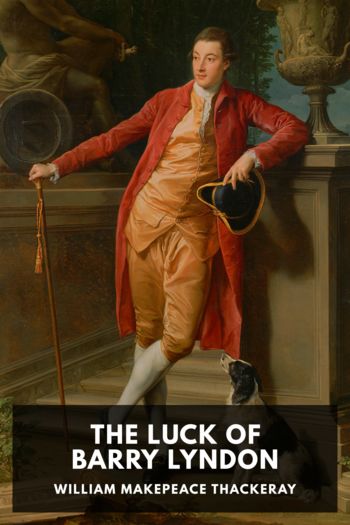Vanity Fair by William Makepeace Thackeray (best thriller novels to read TXT) 📕

- Author: William Makepeace Thackeray
Book online «Vanity Fair by William Makepeace Thackeray (best thriller novels to read TXT) 📕». Author William Makepeace Thackeray
The Captain has a hearty contempt for his father, I can see, and calls him an old put, an old snob, an old chawbacon, and numberless other pretty names. He has a dreadful reputation among the ladies. He brings his hunters home with him, lives with the Squires of the county, asks whom he pleases to dinner, and Sir Pitt dares not say no, for fear of offending Miss Crawley, and missing his legacy when she dies of her apoplexy. Shall I tell you a compliment the Captain paid me? I must, it is so pretty. One evening we actually had a dance; there was Sir Huddleston Fuddleston and his family, Sir Giles Wapshot and his young ladies, and I don’t know how many more. Well, I heard him say—“By Jove, she’s a neat little filly!” meaning your humble servant; and he did me the honour to dance two country-dances with me. He gets on pretty gaily with the young Squires, with whom he drinks, bets, rides, and talks about hunting and shooting; but he says the country girls are bores; indeed, I don’t think he is far wrong. You should see the contempt with which they look down on poor me! When they dance I sit and play the piano very demurely; but the other night, coming in rather flushed from the dining-room, and seeing me employed in this way, he swore out loud that I was the best dancer in the room, and took a great oath that he would have the fiddlers from Mudbury.
“I’ll go and play a country-dance,” said Mrs. Bute Crawley, very readily (she is a little, black-faced old woman in a turban, rather crooked, and with very twinkling eyes); and after the Captain and your poor little Rebecca had performed a dance together, do you know she actually did me the honour to compliment me upon my steps! Such a thing was never heard of before; the proud Mrs. Bute Crawley, first cousin to the Earl of Tiptoff, who won’t condescend to visit Lady Crawley, except when her sister is in the country. Poor Lady Crawley! during most part of these gaieties, she is upstairs taking pills.
Mrs. Bute has all of a sudden taken a great fancy to me. “My dear Miss Sharp,” she says, “why not bring over your girls to the Rectory?—their cousins will be so happy to see them.” I know what she means. Signor Clementi did not teach us the piano for nothing; at which price Mrs. Bute hopes to get a professor for her children. I can see through her schemes, as though she told them to me; but I shall go, as I am determined to make myself agreeable—is it not a poor governess’s duty, who has not a friend or protector in the world? The Rector’s wife paid me a score of compliments about the progress my pupils made, and thought, no doubt, to touch my heart—poor, simple, country soul!—as if I cared a fig about my pupils!
Your India muslin and your pink silk, dearest Amelia, are said to become me very well. They are a good deal worn now; but, you know, we poor girls can’t afford des fraiches toilettes. Happy, happy you! who have but to drive to St. James’s Street, and a dear mother who will give you anything you ask. Farewell, dearest girl,
Your affectionate Rebecca.
P.S.—I wish you could have seen the faces of the Miss Blackbrooks (Admiral Blackbrook’s daughters, my dear), fine young ladies, with dresses from London, when Captain Rawdon selected poor me for a partner!
When Mrs. Bute Crawley (whose artifices our ingenious Rebecca had so soon discovered) had procured from Miss Sharp the promise of a visit, she induced the all-powerful Miss Crawley to make the necessary application to Sir Pitt, and the good-natured old lady, who loved to be gay herself, and to see everyone gay and happy round about her, was quite charmed, and ready to establish a reconciliation and intimacy between her two brothers. It was therefore agreed that the young people of both families should visit each other frequently for the future, and the friendship of course lasted as long as the jovial old mediatrix was there to keep the peace.
“Why did you ask that scoundrel, Rawdon Crawley, to dine?” said the Rector to his lady, as they were walking home through the park. “I don’t want the fellow. He looks down upon us country people as so many blackamoors. He’s never content unless he gets my yellow-sealed wine, which costs me ten shillings a bottle, hang him! Besides, he’s such an infernal character—he’s a gambler—he’s a drunkard—he’s a profligate in every way. He shot a man in a duel—he’s over head and ears in debt, and he’s robbed me and mine of the best part of Miss Crawley’s fortune. Waxy says she has him”—here the Rector shook his fist at the moon, with something very like an oath, and added, in a melancholious tone, “—down in her will for fifty thousand; and there won’t be above thirty to divide.”
“I think she’s going,” said the Rector’s wife. “She was very red in the face when we left dinner. I was obliged to unlace her.”
“She drank seven glasses of champagne,” said the reverend gentleman, in a low voice; “and filthy champagne it is, too, that my brother poisons us with—but you women never know what’s what.”
“We know nothing,” said Mrs. Bute Crawley.
“She drank cherry-brandy after dinner,” continued his Reverence, “and took curaçao with her coffee. I wouldn’t take a glass for a





Comments (0)